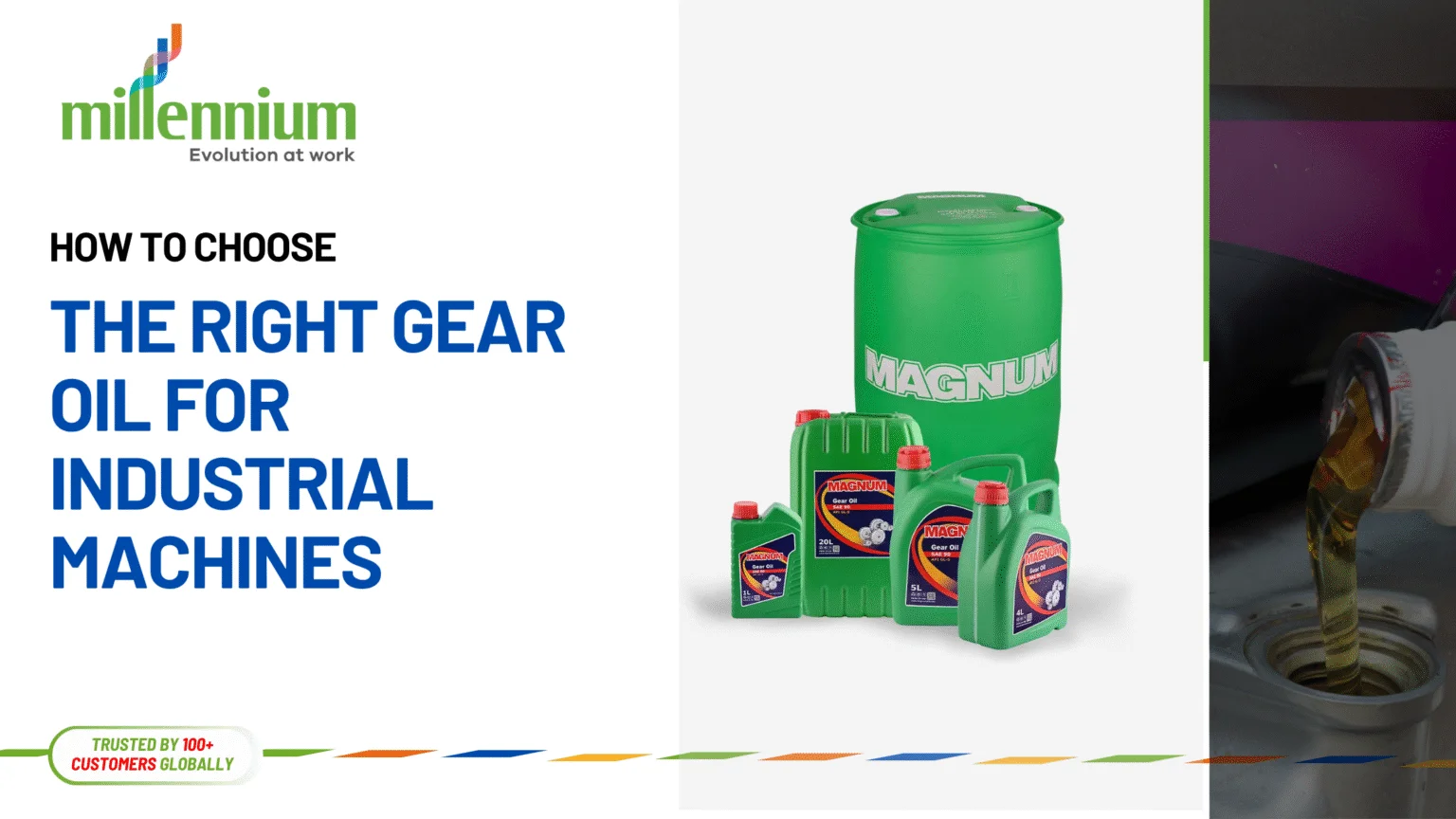How to Choose the Right Gear Oil for Industrial Machines

Why Gear Oil Deserves More Attention Than It Gets
Gear oil often goes unnoticed in industrial maintenance schedules, yet it plays one of the most crucial roles in ensuring the smooth and efficient operation of machinery. Gears are the backbone of many industrial systems—responsible for transmitting power, managing torque, and maintaining mechanical harmony between components. Without proper lubrication, gears can suffer from wear, pitting, overheating, and even catastrophic failure.
Unlike standard lubricants, gear oil is specifically formulated to withstand high pressure, friction, and extreme operating temperatures. It minimizes metal-to-metal contact and forms a protective film that ensures seamless movement under both heavy and light loads. Despite its importance, many operators overlook gear oil selection, relying on outdated formulas or generic lubricants that may not meet the specific requirements of their machinery. This oversight can lead to reduced efficiency, shorter equipment life, and costly downtime.
To ensure maximum performance and reliability, understanding the different types of gear oils and how to choose the right one based on your application is essential.
Types of Gear Oil
Not all gear oils are created equal. Their properties differ depending on base oil type, additives, and intended application. Here are the major categories:
1. Mineral Gear Oils
Mineral gear oils are derived from refined crude oil and have been used for decades in standard industrial applications. They are affordable and provide adequate protection in moderate operating conditions. However, they may require more frequent changes as they degrade faster under high temperature and load conditions.
2. Synthetic Gear Oils
Synthetic gear oils are engineered for superior thermal stability, oxidation resistance, and film strength. They can withstand higher loads and extreme temperatures, making them ideal for heavy-duty gear systems. These oils reduce friction more effectively, extending both oil and equipment life while improving energy efficiency.
3. Semi-Synthetic Gear Oils
As a blend of mineral and synthetic oils, semi-synthetic gear oils offer a balanced combination of performance and cost-efficiency. They provide better stability than mineral oils while being more affordable than fully synthetic alternatives.
4. Extreme Pressure (EP) Gear Oils
EP gear oils contain special additives such as sulfur-phosphorus compounds that protect metal surfaces from wear under high-load conditions. These are widely used in heavy industrial gearboxes, mining equipment, and steel mills where the gears endure continuous stress.
5. Food-Grade Gear Oils
Used in food and beverage manufacturing, these oils comply with NSF H1 standards, ensuring safety in environments where incidental contact with food products might occur. They are formulated with non-toxic base oils and additives to meet strict hygiene and safety requirements.
Understanding these categories helps maintenance engineers select the correct oil that aligns with machinery demands, operating environments, and industry standards.
How to Choose Gear Oil According to Load and Speed
Selecting the right gear oil is not only about brand or viscosity grade; it’s about understanding your machine’s operational profile—its load, speed, temperature, and environment. Here’s how these factors influence your choice:
1. Load Conditions
- Light Loads:
Under low load conditions, friction and temperature are moderate. Mineral or semi-synthetic oils with standard anti-wear additives are usually sufficient. - Moderate to Heavy Loads:
Gearboxes operating under fluctuating or high loads require oils with EP (Extreme Pressure) additives to prevent surface wear and scuffing. Synthetic EP oils provide the best protection in these cases. - Shock Loads:
For applications like crushers or heavy presses where sudden impact loads occur, oils with superior film strength and anti-wear additives are necessary.
2. Speed
- High-Speed Applications:
High-speed gears generate less torque but higher frictional heat. In such cases, lower-viscosity synthetic gear oils are ideal since they ensure efficient cooling and minimize drag losses. - Low-Speed, High-Torque Gears:
Systems like conveyors or hoists that operate slowly under heavy torque benefit from higher-viscosity EP oils that maintain a thick lubricating film even under pressure.
3. Operating Temperature
Extreme heat can degrade oil faster, while very low temperatures can cause thickening. Synthetic gear oils perform better across wide temperature ranges, maintaining optimal viscosity and lubrication film stability.
4. Environment
Dust, moisture, and chemical exposure can affect oil performance. In damp or corrosive environments, gear oils with anti-rust and oxidation inhibitors are recommended. For outdoor or marine conditions, water-resistant synthetic oils are best suited.
5. OEM Recommendations
Always consult the original equipment manufacturer (OEM) manual. It specifies the required viscosity grade (e.g., ISO VG 150, 220, or 320) and oil type suitable for the gear design and operating conditions.
By aligning your choice with these factors, you ensure the gear system’s long-term performance, reduced wear, and improved operational efficiency.
MAGNUM Gear Oils: Perfect Fit for Industrial Machines
For industries seeking reliability, durability, and high performance, MAGNUM Gear Oils stand out as a trusted solution. Designed to meet modern industrial standards, MAGNUM’s range of gear oils ensures superior protection and performance across diverse applications.
1. Advanced Formulation
MAGNUM Gear Oils are formulated with premium base stocks and high-performance additives to deliver exceptional resistance to oxidation, foaming, and sludge formation. They maintain consistent viscosity even under extreme loads and temperatures, ensuring continuous protection.
2. Extended Equipment Life
With excellent film strength and anti-wear properties, MAGNUM Gear Oils minimize friction and metal contact, preventing premature wear. This leads to longer gear life and reduced maintenance frequency.
3. Energy Efficiency and Smooth Operation
The low friction coefficient of MAGNUM Gear Oils enhances power transmission efficiency, resulting in lower energy consumption and smoother gear operation—crucial for industries aiming for productivity and sustainability.
4. Wide Application Range
MAGNUM offers variants for different operational needs:
- MAGNUM EP Series – For heavy-duty industrial gearboxes and mining equipment
- MAGNUM SYN Series – Synthetic oils for high-temperature and high-speed applications
- MAGNUM FG Series – Food-grade oils suitable for processing industries
Each product is designed to perform reliably under challenging conditions, meeting or exceeding global standards like AGMA, DIN, and ISO specifications.
5. Sustainability and Compliance
MAGNUM Gear Oils are formulated to meet modern environmental norms with reduced volatility and longer drain intervals, minimizing waste and operational impact. This makes them an excellent choice for companies committed to sustainable industrial practices.
Final Words
Choosing the right gear oil for heavy machinery may seem like a minor maintenance task, but it has a significant impact on the performance, reliability, and lifespan of industrial machinery. Understanding the type of oil, its viscosity, and its suitability for specific load and speed conditions ensures that your gears operate at peak efficiency.
By investing in high-quality lubricants such as MAGNUM Gear Oils, industries can achieve smoother operation, lower maintenance costs, and enhanced equipment durability. In the world of industrial machinery, the right gear oil is not just a lubricant—it’s the foundation of operational excellence.



